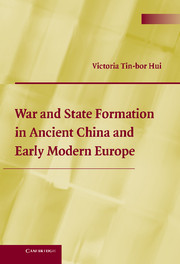Book contents
- Frontmatter
- Contents
- List of Tables and Maps
- Acknowledgments
- 1 A Dynamic Theory of World Politics
- 2 The Dynamics of International Politics in Ancient China
- 3 Rethinking the Dynamics of International Politics in Early Modern Europe
- 4 The Dynamics of State Formation and Transformation
- 5 Conclusion and Implications
- APPENDIXES
- I List of Wars Involving Great Powers in Early Modern Europe (1495–1815)
- II List of Wars Involving Great Powers in Ancient China (656–221 bc)
- III Operational Criteria for the Lists of Wars Involving Great Powers
- IV Chronology of Periods of Unification and Division in Chinese History
- Bibliography
- Index
III - Operational Criteria for the Lists of Wars Involving Great Powers
Published online by Cambridge University Press: 02 February 2010
- Frontmatter
- Contents
- List of Tables and Maps
- Acknowledgments
- 1 A Dynamic Theory of World Politics
- 2 The Dynamics of International Politics in Ancient China
- 3 Rethinking the Dynamics of International Politics in Early Modern Europe
- 4 The Dynamics of State Formation and Transformation
- 5 Conclusion and Implications
- APPENDIXES
- I List of Wars Involving Great Powers in Early Modern Europe (1495–1815)
- II List of Wars Involving Great Powers in Ancient China (656–221 bc)
- III Operational Criteria for the Lists of Wars Involving Great Powers
- IV Chronology of Periods of Unification and Division in Chinese History
- Bibliography
- Index
Summary
Inclusion and Exclusion of Wars Involving Great Powers
The list of wars involving great powers in early modern Europe is adopted from Jack Levy's War in the Modern Great Power System. I compiled the list of wars involving great powers in ancient China using Levy's operational criteria and procedure. The first step is to generate a tentative list of wars based on the most comprehensive chronologies available. These sources include Gao Rui's Zhongguo Shanggu Junshishi (Military History of Ancient China), Lin Jianming's Qin Shi (A History of Qin), Mu Zhongyue and Wu Guoqing's Zhongguo Zhanzhengshi (History of War in China), Yang Kuan's Zhanguo Shi (History of the Warring States), the Academy of Military Sciences' Zhongguo lidai zhanzheng nianbiao (Chronology of Wars in China Through Successive Dynasties), the Military Museum's Zhongguo Zhandian (A Military Dictionary of China), and the Armed Forces University's Zhongguo lidai zhanzhengshi (History of Wars in China Through Successive Dynasties). The second step is systematically to exclude conflicts that are not interstate wars. Civil wars are taken out except those which began with or ended as separate political units, and those in which outside powers intervened militarily against the government. Wars involving nomadic tribes such as rong and di are also excluded because such entities did not exert centralized authority over relatively stable territorial bases. But wars involving “barbarian” entities such as Ba, Shu, Yiqu, and Zhongshan, which formed states over relatively defined territories, are included.
- Type
- Chapter
- Information
- War and State Formation in Ancient China and Early Modern Europe , pp. 249 - 256Publisher: Cambridge University PressPrint publication year: 2005



